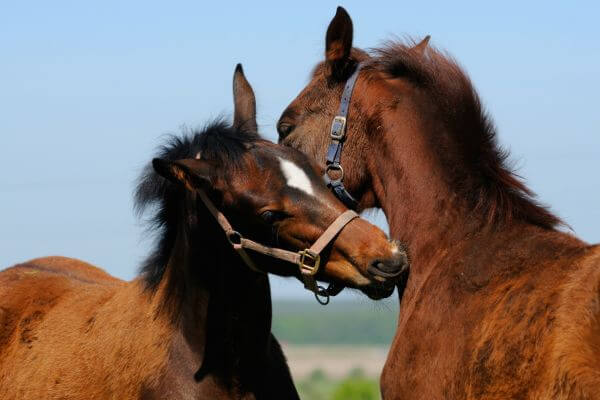In this article, we will explore the intriguing world of animal behavior from a scientific perspective. Understanding the mechanisms that govern the behavior of our furry friends is essential for harmonious coexistence. Let’s dive into this journey of discovery!
The Fundamentals of Canine Behavior

Dogs’ behavior is fascinating. They are intelligent and sensitive creatures whose actions often surprise us. By understanding the fundamentals behind these actions, we can strengthen our relationship with them.
Understanding Animal Behavior is essential when considering the dynamics of our relationship with dogs. Since the dawn of domestication, dogs have been our loyal companions. Their behavior is shaped by a complex interplay between natural instincts and learning. Observing how they respond to stimuli around them reveals much about their needs and desires.
By adopting a positive reinforcement approach, we can enhance the learning and development of our four-legged friends. Praise, treats, and play are powerful tools for encouraging desired behaviors, creating an atmosphere of cooperation and trust.
It’s important to remember that each dog is unique, with its own personality and life history. Therefore, training should be tailored to the individual needs of each animal. With patience, consistency, and love, we can help them become the best possible companions.
Exploring Canine Psychology

Dogs possess a rich inner life, full of emotions and motivations. Understanding the psychology behind their behavior allows us to establish a deeper and more meaningful connection with them.
Scientific studies have shown that dogs are capable of a wide range of emotions, including joy, fear, sadness, and even empathy. Understanding Animal Behavior becomes crucial in deciphering these emotions. Their facial expressions, body postures, and vocalizations provide valuable clues about their emotional state.
In addition to emotions, dogs are also motivated by a variety of needs, such as the search for food, shelter, companionship, and security. By satisfying these needs appropriately, we can promote emotional and behavioral balance in our furry friends.
Canine psychology teaches us the importance of setting clear and consistent boundaries while also recognizing and rewarding positive behaviors. This respectful and empathetic approach contributes to a harmonious and rewarding coexistence with our dogs.
Challenges and Solutions in Canine Learning
Training dogs can present some challenges, but with patience and dedication, it’s possible to overcome them and strengthen the bond between the owner and the animal.
One of the main challenges in dog training is inconsistency on the part of the owners. Frequent changes in rules and training methods can confuse the dog and hinder progress. It is essential to establish a clear routine and remain firm in commands.
Another common challenge is dealing with unwanted behaviors such as excessive barking, aggression, or object destruction. In these cases, it’s important to identify the underlying cause of the behavior and address it positively and assertively.
When facing challenges in training, it’s essential to seek professional guidance, particularly in the realm of Understanding Animal Behavior. A qualified trainer can offer customized techniques and strategies to address the specific needs of your dog, ensuring effective and lasting results.
Creating a Favorable Learning Environment
The environment in which a dog lives plays a crucial role in its development and behavior. By creating an enriching and safe environment, we can facilitate the learning process and promote the well-being of the animal.
An environment rich in sensory stimuli, such as interactive toys, cognitive challenges, and socialization opportunities, stimulates the dog’s mind and prevents boredom and frustration. This not only strengthens the bond between the owner and the animal but also reduces the risk of unwanted behaviors.
Additionally, it’s important to provide the dog with a quiet and comfortable space for rest and relaxation, a practice rooted in Understanding Animal Behavior. A soft bed, fresh water, and a shaded area to shelter from the sun are essential elements for the physical and emotional well-being of the animal.
Finally, love, affection, and attention are essential for the healthy development of a dog. By demonstrating affection and care in our daily interactions, we strengthen the trust and emotional bond with our faithful companion.
The Importance of Physical and Mental Activity
Physical and mental exercise plays a fundamental role in the health and behavior of dogs. By providing adequate opportunities for physical and mental activities, we contribute to the overall well-being of the animal.
Lack of physical activity can lead to boredom, frustration, and even behavioral problems such as hyperactivity and object destruction. Therefore, it’s essential to offer the dog regular opportunities for exercise, such as walks, outdoor play, and agility sessions.
In addition to physical exercise, dogs also need mental stimulation to keep their minds sharp and healthy. Intelligence games, trick training, and food puzzles are excellent ways to challenge the dog’s brain and promote its mental satisfaction.
By integrating physical and mental activities into the dog’s daily routine, we are investing in its long-term health and happiness. These enriching experiences not only strengthen the bond between the owner and the animal but also promote an active and balanced lifestyle for both parties.
Building a Relationship of Trust and Respect
The foundation of any healthy relationship between an owner and their dog is mutual trust and respect. By cultivating these fundamental values, we strengthen the bond and promote a harmonious and rewarding coexistence.
Trust is earned through consistency, predictability, and respect for the dog’s boundaries. By fulfilling our commitments to them and demonstrating calm and secure leadership, we establish a solid foundation for a lasting and meaningful relationship.
Mutual respect involves recognizing and valuing the needs and feelings of the dog, just as we expect them to do with us. This means respecting their personal space, individual preferences, and rest time, ensuring they feel safe and respected in our environment.
By prioritizing the building of a relationship based on trust and respect, we are investing in the emotional and behavioral well-being of our dog. This deep and meaningful connection brings us not only joy and satisfaction but also teaches us valuable lessons about empathy, compassion, and unconditional love.
Strategies for Addressing Common Behavior Problems

Resolving canine behavior problems can be challenging, but with the right strategies, it’s possible to overcome obstacles and promote a more harmonious coexistence between the owner and the dog.
A common problem faced by many owners is destructive behavior, such as chewing furniture or digging holes in the garden. To deal with this, it’s important to identify the underlying cause of the behavior, which may include boredom, anxiety, or excess energy, and offer appropriate alternatives for activities and toys.
Another common challenge is aggressive behavior, whether towards other dogs, people, or objects. In these cases, it’s essential to seek the help of a qualified professional who can assess the situation and develop a safe and effective intervention plan to modify the dog’s aggressive behavior.
Additionally, behavioral problems such as separation anxiety, fear of noises, or socialization difficulties can be addressed through desensitization techniques, obedience training, and behavioral therapies. With patience, consistency, and adequate support, it’s possible to overcome these challenges and promote the emotional well-being of the dog.
Engaging in the Canine Community

Participating in the canine community offers a range of benefits, both for the owner and the dog. By connecting with other dog lovers, it’s possible to share experiences, learn new techniques, and strengthen the bond with your faithful companion.
There are various ways to get involved in the canine community, such as joining training groups, socialization events, or even volunteering at animal shelters. These opportunities not only provide moments of fun and learning but also help create a support network and friendship with other owners.
Additionally, engaging in the canine community can be an effective way to raise awareness about important issues such as responsible adoption, animal welfare, and animal rights, all of which stem from a foundation of Understanding Animal Behavior. By sharing your passion and knowledge with others, you contribute to building a more compassionate and supportive community.
Finally, participating in the canine community is a unique opportunity to
enrich your dog’s life by providing them with positive and stimulating social experiences. By connecting with other dogs and people, your pet develops important social skills and enjoys a happier and more balanced life.
Strengthening Bonds with Your Dog
Throughout this article, we have explored the fundamentals of animal behavior from a scientific perspective, highlighting the importance of understanding and empathy in our relationship with our four-legged friends. Understanding the needs, emotions, and behaviors of dogs not only enriches our daily lives but also strengthens the bonds of trust and respect that we share with them.
Through strategies based on positive reinforcement, patience, and consistency, we can shape the behavior of our dog in a gentle and effective way, promoting its physical and emotional well-being. By providing an enriching environment, offering adequate physical and mental activities, and cultivating a relationship of trust and respect, we are investing in the healthy and happy future of our faithful companion.
Therefore, I invite you to apply the knowledge and strategies shared in this article to your relationship with your dog. Remember that each interaction is an opportunity to strengthen the bonds and enrich the life of your pet. Be patient, be consistent, and above all, be a loyal and loving friend to your dog.
If you have any questions, share your experiences, or want more information on the subject, don’t hesitate to leave a comment below. Your participation is essential to enriching our community of dog lovers and promoting an even more harmonious and rewarding coexistence with our furry friends.

Sou um apaixonado por tecnologia, sempre antenado nas últimas novidades. Mergulho nos detalhes de gadgets, inteligência artificial e realidade virtual. Minha dedicação em entender o futuro da tecnologia me destaca entre os entusiastas digitais